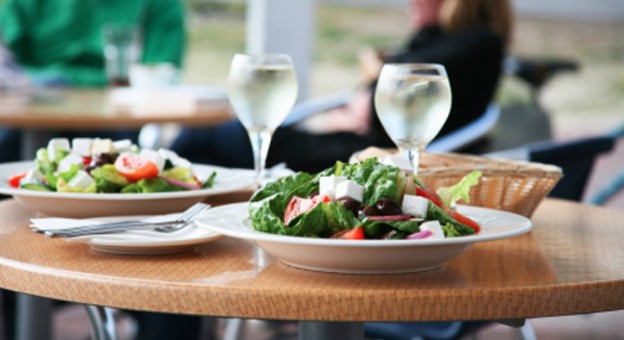The Holiday Detour Déjà Vu
Recently I had a session with a long-standing client that is having great success in managing his weight and stabilizing his blood sugar. He’s cut down on meat and increased fish. Cheese has been replaced with sunflower seeds and vegetables. Nighttime eating is under control and portions are down. Success all around. It was great to hear.
But the next day he was traveling to visit family and he rather sheepishly implied that it was a forgone conclusion that on the trip he would not necessarily be sticking to his eating plan, instead allowing space for bread in restaurants and perhaps some desserts. Why I asked him? Why allow yourself to go so far off course while on vacation from what is now habitual at home? Allowing these now banished habits to return for even a few days can wipe out many of the benefits he’s experienced so far and skew his metabolism to work against him once again, not to mention wreck havoc with his hard won mindset that helped him to get the results he was finally experiencing. After a lengthy conversation, he made it his goal to work on translation: translating his habits at home to the outside world.
As I write this I am on a plane headed towards San Diego and a weeklong road trip up the coast of California with my best friend Allison. I am also, concurrently, doing a six-month raw food diet and I am happy to say that I have been as close to 100% as possible and have been enjoying it tremendously. I have great energy and sleep well. I’ve lost six pounds, which also pleases me. And mostly, as I mentioned before, I enjoy the discipline of it. But as you may imagine, eating raw food 100% on the road is not an easy endeavor. Our world is not set up for convenience to the raw foodist unless you are willing to eat an apple that is so shiny from the wax coating that you could put your make-up on by it’s reflection. Even the nuts that are available in airport kiosks are roasted and salted. Salads offered in the more upscale shops in the airport invariably contain cheese or bacon or eggs.
So, what do you do? How do you keep your healthful intentions in place while on the road, excited for the fun ahead? Well, you plan… and you bring snacks with you.
Packed in my overstuffed carry-on bag I have an apple and a grapefruit. Correction, had an apple. Ate it on takeoff. I also brought along a week’s worth of raw granola so that I can have good breakfasts on the road. Believe me when I say that I indeed salivated over the egg and cheese on a bagel that my row-mate was eating shortly after boarding but the truth is I wouldn’t eat that anyway. So I munch on my apple, satisfied in knowing that I am taking my practice of raw food on the road, and translating it into the outside world where it is highly inconvenient and not necessarily congruent with our imaginings of what vacations should be: eating, drinking, and partying – indulgences I’m not unfamiliar with!!
So, I’m curious. How many of you are able to translate your healthy weekday habits into your weekends and vacations? And if not, why not? It’s a good question because many of us are really good at maintaining our healthy habits from Monday through Friday, but when the weekend comes, the warrior inside us likes to bust out and indulge in everything we’ve been avoiding all week long under the pretext that we “deserve” it, that we “worked hard all week” that it is “only two days” and “how bad can that be”? Turns out, that two days of bad eating can negate all the healthy habits that you worked hard all week at maintaining.
Let’s take a look at a not-so-unusual scenario:
Saturday Brunch with your friends at Pastis on a breezy summer day, and you decide that it’s a good day to have a mimosa. The bread basket comes and with it a warm dish of seasoned olive oil that just begs you to try it. So you decide to have one. How bad can one be, right? After that, mindful of your weekday nutrition plan, you have the vegetable omelet but since it’s the weekend you opt for a slice of melted cheese on it even though you avoid cheese during the week. With your meal you order another mimosa because you’re feeling pretty good and want to enjoy your time with your friends. After the plates are cleared a round of cappuccinos are ordered for the table, which you decide is better than getting dessert.
The tally? Approximately, an additional 700 calories above what you are doing at breakfast during the week, if you are choosing to have a vegetable omelet for breakfast before work. Add in the calories of the vegetable omelet (depending on the vegetable, how much oil or butter was used and the quantity of eggs) and you just had a breakfast that passes the 1000 calorie mark.
So Let’s break it down…
A mimosa will run you about 150 calories. If you have two, you just added 300 calories to your meal. A single slice of bread dipped in olive oil? Depending on the size of the slice of bread and how many dips in the oil, that could run you an additional 200. A single slice of cheese can run you about another 100 and if the cappuccino was made with whole milk, then that would be another 60 to 100 calories, before you add sugar, depending on the size of the cappuccino.
And we haven’t even gotten to dinner yet! That could be another culinary event that could well exceed 1000 calories if you are dining out in a restaurant. The end result is that in just two meals you could potentially pack in an additional 1500 calories a day on the weekend. In two days, that is 3000 calories. How many calories are needed to gain a pound? 3500. So if you are wondering why you are having a hard time losing weight or keeping it off, you need to look at what you are doing on the weekends and on vacation.
Practicing Discernment in Place of Decadence…
Now, I’m not suggesting that you never ever have bread, dessert or wine again. Not only is that unrealistic, it is also depriving us of one of the greatest pleasures in life. What I am asking is, can you pick one meal a week to indulge yourself with? Or perhaps skip cocktails one day in lieu of the bread and oil or dessert? Or if you prefer, skip bread and dessert in order to have cocktails. What you want to strive for is discernment. Rather than making every meal a culinary feast of wine, bread, cheese and chocolate, make them instead mini-culinary experiences that offer pleasure while helping you preserve your health commitments that you are working hard all week at maintaining.
Eating well and taking care of your body all the time is a difficult practice. It takes planning, effort, and discipline. If it were easy we would never gain weight, never get sick and live to be centenarians. It is definitely a challenge. But it is a challenge that can have a positive influence on every area of your life. When you are eating well, exercising and taking care of your health, the ripple effect is that it influences the quality of your relationships, career and overall happiness. Because if you are honest with yourself, you’ll admit that these meals can often leave you feeling hung-over and betrayed. Betrayed by your own weaknesses. And that too has a ripple effect across your life and will also influence your relationships and career, but perhaps not in the way you want it to.
Ask yourself today what adjustments you are willing to make in order to achieve your health goals. Finding balance on the weekends and on vacation might just be one small adjustment in your thinking that might help you get there.


